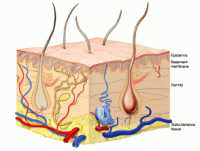
01 Jun Protein Critical for Skin Barrier Function Identified
MedicalResearch.com Interview with:

Dr. Millar
Sarah E. Millar, Ph.D.
Director, Black Family Stem Cell Institute
Professor, Departments of Cell, Developmental and Regenerative Biology and Dermatology
Icahn School of Medicine at Mount Sinai
New York, NY
MedicalResearch.com: What is the background for this study?
Response: One of the major roles of the skin is to serve as a protective barrier, both preventing external insults, such as toxins and pathogens, from entering the body, and helping to retain moisture. The mechanisms required for appropriate skin barrier formation remain incompletely understood. Elucidating these processes is important for understanding and developing improved treatments for dermatological diseases in which the skin barrier is dysfunctional, such as eczema and psoriasis.
Understanding epigenetic regulators, proteins that modify the structure of genetic material, is an area of scientific interest, as many new drugs target these proteins. Importantly, multiple epigenetic regulators have been shown to be important in skin development. My lab has focused on one group of epigenetic regulators, histone deacetylases (HDACs), because HDAC inhibitors show promise for treating several different cancers and other disorders in which cell proliferation is poorly controlled. We previously showed that HDACs 1 and 2 are required for normal skin development.
In the current study, we investigated whether the related protein HDAC3 is also important in establishing the skin barrier.

Dermnet NZ image
MedicalResearch.com: What are the main findings? What role might this protein play in epidermal barrier disorders such as ichthyosis, bullous disorders, eczema or other cutaneous diseases?
Response: Using genetically engineered mouse models, we deleted HDAC3 in the epidermis, the outermost layer of the skin, and found that the mutant mice failed to survive due to barrier dysfunction. Our data show that HDAC3 modulates diverse biological processes required for normal skin development, and indicate that HDAC3 interacts with multiple DNA-binding proteins to regulate its target genes.y65
Given its critical role in barrier establishment, HDAC3’s activity may be disrupted in skin disorders in which the barrier does not function properly.
Interestingly, we found that mice lacking epidermal HDAC3 have a very different phenotype from mice lacking epidermal HDACs 1 and 2, demonstrating that these related proteins have distinct functions in regulating skin development. Additionally, we found that while HDAC1/2-mediated regulation of epidermal gene expression is dependent on enzymatic activity, HDAC3 appears to act in an enzyme-independent fashion. This has important implications for the use of HDAC inhibitors, as these drugs specifically target HDAC enzymatic function. Our findings suggest that use of HDAC inhibitors might recapitulate loss of HDAC1/2, but not loss of HDAC3.
MedicalResearch.com: What should readers take away from your report?
Response: HDAC3 is critical for epidermal development and establishment of the skin barrier. Our data suggest that it accomplishes its gene regulatory activities primarily as a scaffolding protein, in concert with diverse DNA-binding proteins.
MedicalResearch.com: What recommendations do you have for future research as a result of this work?
Response: An important area of future investigation will be to characterize the role of HDAC3 in models of skin disease. It will be interesting to determine whether loss of HDAC3 activity plays a role in disorders such as eczema and psoriasis.
We have no competing interests to disclose.
Citation:
Katherine M. Szigety, Fang Liu, Chase Y. Yuan, Deborah J. Moran, Jeremy Horrell, Heather R. Gochnauer, Ronald N. Cohen, Jonathan P. Katz, Klaus H. Kaestner, John T. Seykora, John W. Tobias, Mitchell A. Lazar, Mingang Xu, Sarah E. Millar. HDAC3 ensures stepwise epidermal stratification via NCoR/SMRT-reliant mechanisms independent of its histone deacetylase activity. Genes & Development, 2020; DOI: 10.1101/gad.333674.119
JOIN OUR EMAIL LIST
[mailpoet_form id="5"]We respect your privacy and will never share your details.
[last-modified]
The information on MedicalResearch.com is provided for educational purposes only, and is in no way intended to diagnose, cure, or treat any medical or other condition. Always seek the advice of your physician or other qualified health and ask your doctor any questions you may have regarding a medical condition. In addition to all other limitations and disclaimers in this agreement, service provider and its third party providers disclaim any liability or loss in connection with the content provided on this website.
Last Updated on June 1, 2020 by Marie Benz MD FAAD
